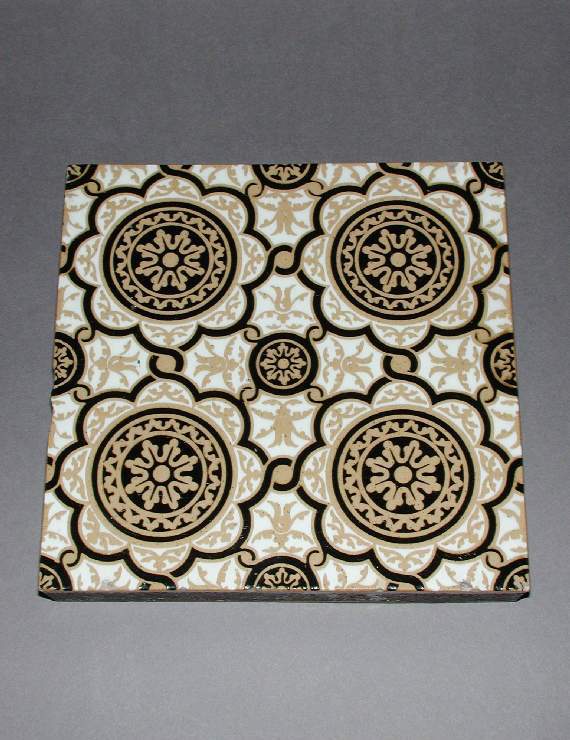Current Location: Gallery 27 (Glaisher)
Titles
Inlaid floor tile
Maker(s)
Factory:
Minton & Co.
Entities
Categories
Description
Earthenware floor tile with inlaid geometric design, lead-glazed.
Tile formed from a sandwich of fine buff earthenware top and bottom and a thick layer of coarse red-brown earthenware in the middle. Upper surface decorated with a geometric pattern of four floral motifs in white, buff and dark red-brown, inlaid after forming with a plaster dye, and lead-glazed. Underside buff and unglazed.
Notes
History note: Frank Rookes, until March 1977
Legal notes
Given by Frank Rookes, 1977
Measurements and weight
Height: 2.5 cm
Width: 15.25 cm
Acquisition and important dates
Method of acquisition: Given
(1977-03-07)
by
Rookes, Frank
Dating
19th Century, Late
Production date:
AD 1871
Note
Glazed encaustic tiles, such as this example, are made by impressing a shallow pattern into the unfired clay, using a hand carved plaster mould. The resulting indentations are then filled with different coloured slips (liquid clay); a thin layer of glaze is then applied before firing.
Minton, founded in 1793 by Thomas Minton (1765-1836), originally produced blue printed earthenware and, later, creamware, bone china and other products, particularly tableware. Taking over in 1836, his son Herbert Minton revolutionised production methods and introduced new lines in encaustic and printed tiles, figures and ornamental wares. In 1858 the business passed to Herbert’s nephew, Colin Minton Campbell (1827-85), who continued the expansion. The early business traded under various names, from 1845 it was known as Minton & Co. and from 1873 as Mintons Ltd.
The sandwich construction of the tile combines a fine surface for the inlaid pattern with the robustness of the coarse clay centre and also prevents warping. The design here is made to be part of a continuing pattern. The texture and bright colours of the finished tile echo Minton’s coloured lead-glazed ‘Majolica wares’, introduced to great acclaim at the Great Exhibition of 1851. Majolica ware tiles were also popular in the latter part of the century, but generally used for wall or fireplace decoration.
Tile making increased dramatically in 19th century Britain, encouraged by church building and restoration and by new concerns about public health. Minton lead the way in both innovation and the revival of mediaeval production methods, using recently re-discovered techniques to make inlaid (or encaustic) floor tiles for the Houses of Parliament and other major buildings, introducing dust-pressing methods and making a wide range of printed and moulded relief tiles.
School or Style
Gothic Revival
People, subjects and objects depicted
Components of the work
Middle
composed of
earthenware
( dark brown)
Top And Bottom
composed of
earthenware
( fine buff)
Techniques used in production
Inlay (process)
: Pattern formed with a plaster dye, inlaid, lead-glazed
Lead-glazing
Inscription or legends present
- Text: MINTON & CO./PATENT/STOKE UPON TRENT
- Location: Underside
- Method of creation: Impressed
- Type: Mark
Inscription present: diamond-shaped mark for 12th October 1871
- Location: Underside
- Method of creation: Impressed
- Type: Registration mark
- Text: 24
- Location: Underside
- Method of creation: Impressed
- Type: Mark
Inscription present: (small circle)
- Text: o
- Location: Underside
- Method of creation: Impressed
- Type: Mark
References and bibliographic entries
Identification numbers
Accession number: C.4-1977
Primary reference Number: 15302
Stable URI
Audit data
Created: Saturday 6 August 2011
Updated: Tuesday 30 April 2024
Last processed: Monday 4 August 2025
Associated departments & institutions
Owner or interested party:
The Fitzwilliam Museum
Associated department:
Applied Arts




